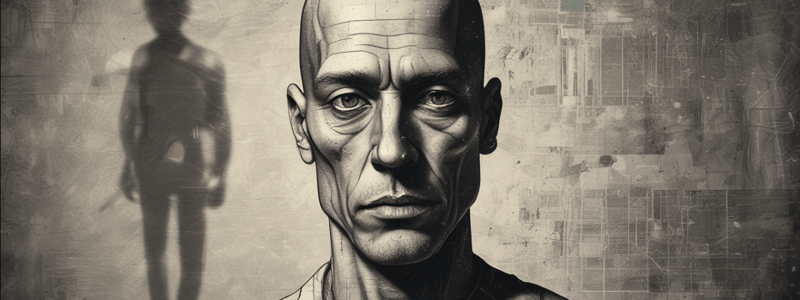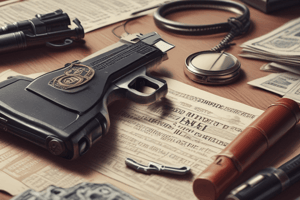Podcast
Questions and Answers
True or false: Subjective information is the primary source of information in criminal investigations?
True or false: Subjective information is the primary source of information in criminal investigations?
True (A)
True or false: Alphonse Bertillon developed the anthropometric method of identification in criminal investigations?
True or false: Alphonse Bertillon developed the anthropometric method of identification in criminal investigations?
True (A)
True or false: The odds of two persons having the same description and measurements according to Bertillon's method is 4,194,304:1?
True or false: The odds of two persons having the same description and measurements according to Bertillon's method is 4,194,304:1?
True (A)
True or false: An eyewitness is someone who personally saw the crime transpire?
True or false: An eyewitness is someone who personally saw the crime transpire?
True or false: A corroborative witness can provide information about the circumstances which surrounded a crime?
True or false: A corroborative witness can provide information about the circumstances which surrounded a crime?
True or false: Additional evidence is required to support the conclusion of guilt beyond a reasonable doubt for a corroborative witness?
True or false: Additional evidence is required to support the conclusion of guilt beyond a reasonable doubt for a corroborative witness?
True or false: An independent witness is associated with the victim, suspect, or the crime?
True or false: An independent witness is associated with the victim, suspect, or the crime?
True or false: Composite pictures of the face are created using photographs of previously convicted criminals.
True or false: Composite pictures of the face are created using photographs of previously convicted criminals.
True or false: Interrogation is used when the person is reluctant or unwilling to provide information.
True or false: Interrogation is used when the person is reluctant or unwilling to provide information.
True or false: Detailed notes are recommended to be taken directly after an interview, rather than during the interview.
True or false: Detailed notes are recommended to be taken directly after an interview, rather than during the interview.
True or false: Audio-visual recordings are not essential during interviews, but are recommended for interrogations.
True or false: Audio-visual recordings are not essential during interviews, but are recommended for interrogations.
True or false: Photograph identification is used when the suspect is in custody and there were witnesses to the crime.
True or false: Photograph identification is used when the suspect is in custody and there were witnesses to the crime.
True or false: In photograph identification, the number of photographs shown to the witness should be at least nine.
True or false: In photograph identification, the number of photographs shown to the witness should be at least nine.
True or false: Identification parades are commonly used when the suspect is not in custody and there were witnesses to the crime.
True or false: Identification parades are commonly used when the suspect is not in custody and there were witnesses to the crime.
True or false: In an identification parade, a specific suspect is placed among a number of other people, who were definitely not involved in the commission of the crime.
True or false: In an identification parade, a specific suspect is placed among a number of other people, who were definitely not involved in the commission of the crime.
True or false: The most important principle of an identification parade is fairness towards the suspect?
True or false: The most important principle of an identification parade is fairness towards the suspect?
True or false: Positive identification of perpetrators by victims and/or witnesses is heavily relied upon in contact crimes?
True or false: Positive identification of perpetrators by victims and/or witnesses is heavily relied upon in contact crimes?
True or false: A positive identification at an identification parade is admissible evidence in court when conducted according to standard operating procedures?
True or false: A positive identification at an identification parade is admissible evidence in court when conducted according to standard operating procedures?
True or false: Accurate memory of an event decreases over time; the longer the time that passes between observing an event and trying to recall the details of the event, the greater the risk that details will be forgotten.
True or false: Accurate memory of an event decreases over time; the longer the time that passes between observing an event and trying to recall the details of the event, the greater the risk that details will be forgotten.
True or false: Eyewitness identifications of individuals of races other than the witness are, on average, less accurate than identifications of individuals of the same race.
True or false: Eyewitness identifications of individuals of races other than the witness are, on average, less accurate than identifications of individuals of the same race.
True or false: Unconscious transference is the process of intentionally filling in gaps in memory with information gleaned from other memories.
True or false: Unconscious transference is the process of intentionally filling in gaps in memory with information gleaned from other memories.
True or false: Informal identification is a technique that should take place shortly after the commission of a crime, ideally between ten and twenty minutes.
True or false: Informal identification is a technique that should take place shortly after the commission of a crime, ideally between ten and twenty minutes.
True or false: Single purpose interrogation aims to convince interrogees that the only way out is to confess, because the investigator has convincing evidence of their guilt already.
True or false: Single purpose interrogation aims to convince interrogees that the only way out is to confess, because the investigator has convincing evidence of their guilt already.
True or false: Pessimism interrogation aims to paint a positive picture of the future by using fear of the unknown and raising doubts about what awaits the interrogees.
True or false: Pessimism interrogation aims to paint a positive picture of the future by using fear of the unknown and raising doubts about what awaits the interrogees.
True or false: Guilt feelings interrogation aims to evoke guilt in the person by suggesting that family and friends are disappointed and shocked by their involvement and that a confession or cooperation will bring the person much needed redemption or relief by accepting responsibility and "doing the right thing".
True or false: Guilt feelings interrogation aims to evoke guilt in the person by suggesting that family and friends are disappointed and shocked by their involvement and that a confession or cooperation will bring the person much needed redemption or relief by accepting responsibility and "doing the right thing".
True or false: General information forms part of PDs and is usually only available if the alleged perpetrator was arrested previously and the information was documented, or if the informant/witness knows the person well enough to supply such detailed information.
True or false: General information forms part of PDs and is usually only available if the alleged perpetrator was arrested previously and the information was documented, or if the informant/witness knows the person well enough to supply such detailed information.
Flashcards are hidden until you start studying





